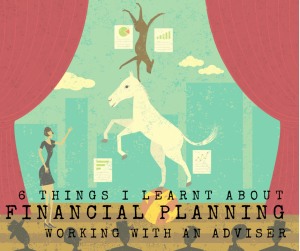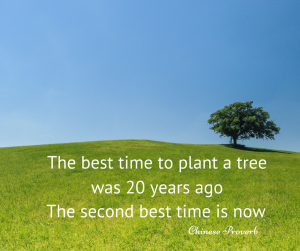 Before I launched into the world of body corporates I was a small business manager. My particular expertise is office systems. I’ve been blessed to work at a number of very small businesses in an administrative role, and have learnt many different systems for managing workflow.
Before I launched into the world of body corporates I was a small business manager. My particular expertise is office systems. I’ve been blessed to work at a number of very small businesses in an administrative role, and have learnt many different systems for managing workflow.
Last year an opportunity arose for me to use those skills to assist a financial planner. I’ve been onsite a couple of times a week for the last eight months and have found myself immersed in the business of providing financial planning services.
Most of my life I’ve had this idea that one day I’ll be rich. I really don’t know why, particularly given the plethora of evidence to the contrary, but it’s a thought that lingers like a couch surfing relative, fun, but not really contributing anything.
I was excited then, and somewhat daunted, to work with a Financial Adviser. I was hoping for some sort of miracle “aha” moment but instead I learnt these six things.
1. Know your financial goals
Financial Advisers make financial plans. The plan that they create will revolve around your personal “goals”.
Being able to state your financial goals clearly is a huge leap forward when it comes to actually achieving those goals.
Unfortunately this step often turns out to be the most challenging for people.
Coming up with a wish list isn’t really that hard and it will likely include such things as health, wealth and some variety of sports car.
But it turns out “I want to be wealthy” isn’t really something a Financial Adviser can work with. That just leads to a slew of other questions like “how much is wealthy?” or the much harsher “how do you plan to get there?”
When it comes right down to it we all have some financial goals. There may be the pie in the sky “I want to be rich”, but then there’s the more immediately achievable goals like buy a new car, save a deposit or buy an investment property.
These are the goals financial planning can help you with, whether you do it yourself or with an advisers help.
Which is not to suggest you shouldn’t aim for the pie in the sky, dreams are excellent motivators. It’s more that taking action is vital. So aim for the pie in the sky but plan the part of that path you can see now.
Whatever that goal is, you must believe you can attain it, and it must be significant enough to motivate you to make the required trade-offs.
2. Financial planning is all about trade-off
Depending on your resources you can do just about anything you want. Sadly though, it’s very unlikely you will be able to do everything.
Hence the importance of goals. You’re prioritising what’s really important in your life, and you do that so you can work out the trade-offs.
Me, for instance, I like to buy energy drinks, so I do, every day.
I would also like to go on a month long driving holiday to East Coast of the United States.
Am I prepared to trade the energy drinks for the holiday? Ooh… tough call. I am a slave to caffeine, and giving up would be a wrench.
On the other hand I am prepared to save money by staying at home and pottering around the house rather than partying or doing stuff. That will save plenty and it’s a trade-off I can live with.
That’s a simple example regarding saving, but the concept of trade-offs encompasses some very complex decisions like if I buy this property and tie up my capital here, what is the trade-off, the opportunity cost, of not investing somewhere else?
Your goal(s) will help prioritise what’s important to you so you can identify the trade-offs you’re prepared to make, and those you’re not.
3. Know what’s really important to you
To achieve your financial goals you’re going to have to make some sort of compromise. That said, there’s going to be something you just won’t give up.
There’s no sense creating any plan, financial or otherwise, that includes some trade-off you just won’t get behind. You minimise the effectiveness of the plan, then you’ll feel demotivated, and eventually just chuck the whole thing away.
To succeed with a plan it’s important to know your deal-breakers.
For me building a business is an important part of what I want out of life, and I will, and have, made lots of compromises to make that happen.
One of those compromises is that I refuse to work more than 40 hours a week. I know that if I worked more I could grow the business faster, however the trade-off, additional stress, is not worth it for me. I’ll take the slower growth.
My partner doesn’t have the same deal-breaker at all. He routinely works 50 – 60 hours a week. His deal breaker is football. He plays every Tuesday night and some weekends. Nothing must interfere with the footy.
Get clear on which parts of your life are really important to you. Protect them!
4. Investing is just another name for saving
There are all sorts of strategies you can employ to build wealth however the key to most of them is going to be regular savings.
It’s pretty boring I know, but there it is. Some form of saving is going to be necessary if you want to build any sort of investment portfolio.
If you’re buying your first property, you must save a deposit. And when you’ve done that there are more enforced savings in the form of mortgage repayments.
If you’re buying an investment property, you’ll need to either save the funds for another deposit or use the equity in another property, equity you’ve created by making repayments or, that word again, saving.
If you’re building up your superannuation, you must save a portion of your salary as Superannuation Guarantee and then you may save more by salary sacrificing or making additional contributions.
If you’re building an investment portfolio, a regular savings plan and dollar-cost-averaging are your good friends.
Saving, saving, saving. There’s just no way around it. Such a blow for me. I do not like to save.
5. Know your risk tolerance
A financial plan is a group of strategies you implement to manage and grow your savings.
What strategy or strategies will work for you is completely dependent on your goals, your current circumstances and your risk tolerance.
Just as we all have different resources and goals we all have different risk tolerances.
For Financial Advisers this idea of risk tolerance is critical, since they must tailor a plan that, as much as possible, meets each individual’s goals and tolerances.
For those of us who aren’t using a Financial Adviser it’s still a good concept to consider when making your plans, particularly if you’re planning with someone else.
For instance, on my 30th birthday I immigrated to Australia with $2,500 and two small children. It’s pretty safe to say that I have a high risk tolerance.
My partner by comparison has worked for the same employer for over 20 years and lived in his last house for over 16 years. He’s not one for making quick decisions. His risk tolerance is lower.
Risk tolerance goes hand in hand with the concept of due diligence, which simply means find out the risk factors so you may make an informed decision about the trade-offs.
If you buy in a body corporate part of that due diligence is a pre purchase strata report.
6. Money management is just another skill
There are thousands of financial strategies covering all sorts of life hacks, tips, tricks and solid tactical plans for saving and investing your funds.
They can be very simple, like automating regular payments to foster a sense of wealth, to complex strategic and tactical plans for building wealth through superannuation, property and shares.
Financial planning is a skill; Financial Advisers must spend hundreds of hours every year refining and updating those skills as part of the continuing professional development because of the complexity of the field.
And I’m a fairly financially savvy person but sometimes my Adviser friend and I will have whole conversations where I understand about one word in ten.
For someone like me who’s not in a position to employ a Financial Adviser the world of investing seems very daunting.
As my friend pointed out to me though, you don’t need to learn thousands of strategies. You only need to learn the strategies you’re planning on utilising, and maybe a couple of contrasts, just to make sure you’re doing your due diligence.
Money management and investment is a skill that can be learnt. Just like any other skill, your first step is to resolve to learn it.
What I’m taking away from all this
Learning about financial planning and the processes involved has been an invaluable experience for me.
I’ve learnt that making a plan and committing to it is vital. But then so is enjoying your life right now. Finding the balance is key.
I’ve learnt I must get better at saving. Sigh.
I’ve learnt that wealth is something that happens as the result of careful planning and implementation. It’s an outcome of discipline as much as risk.
And I’ve learnt that I must keep learning.
What about you, have you worked with an Adviser? What did you learn? Leave a comment and let me know.
 Unless stated otherwise all the information on this website relates to Queensland legislation.
Unless stated otherwise all the information on this website relates to Queensland legislation.